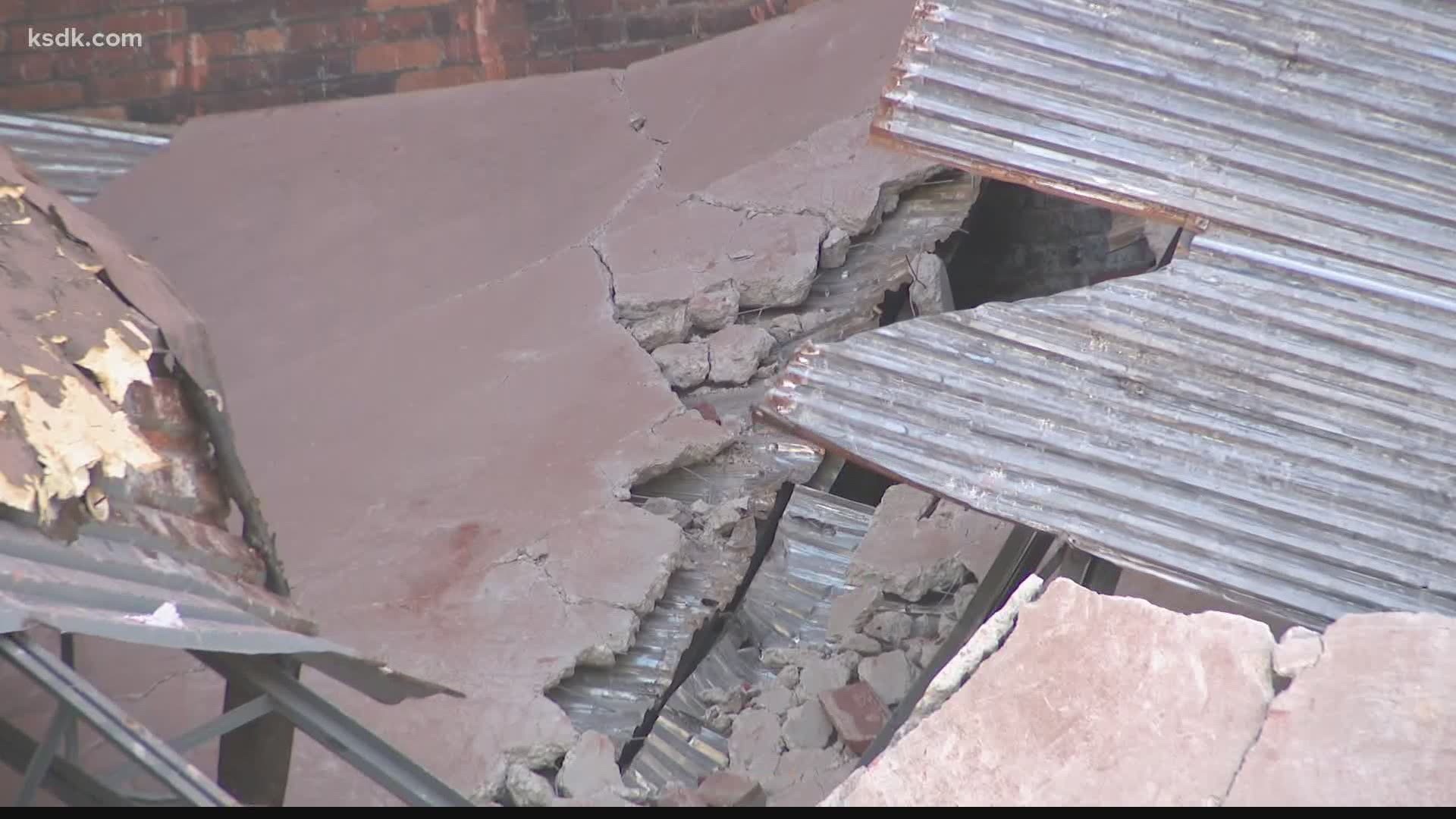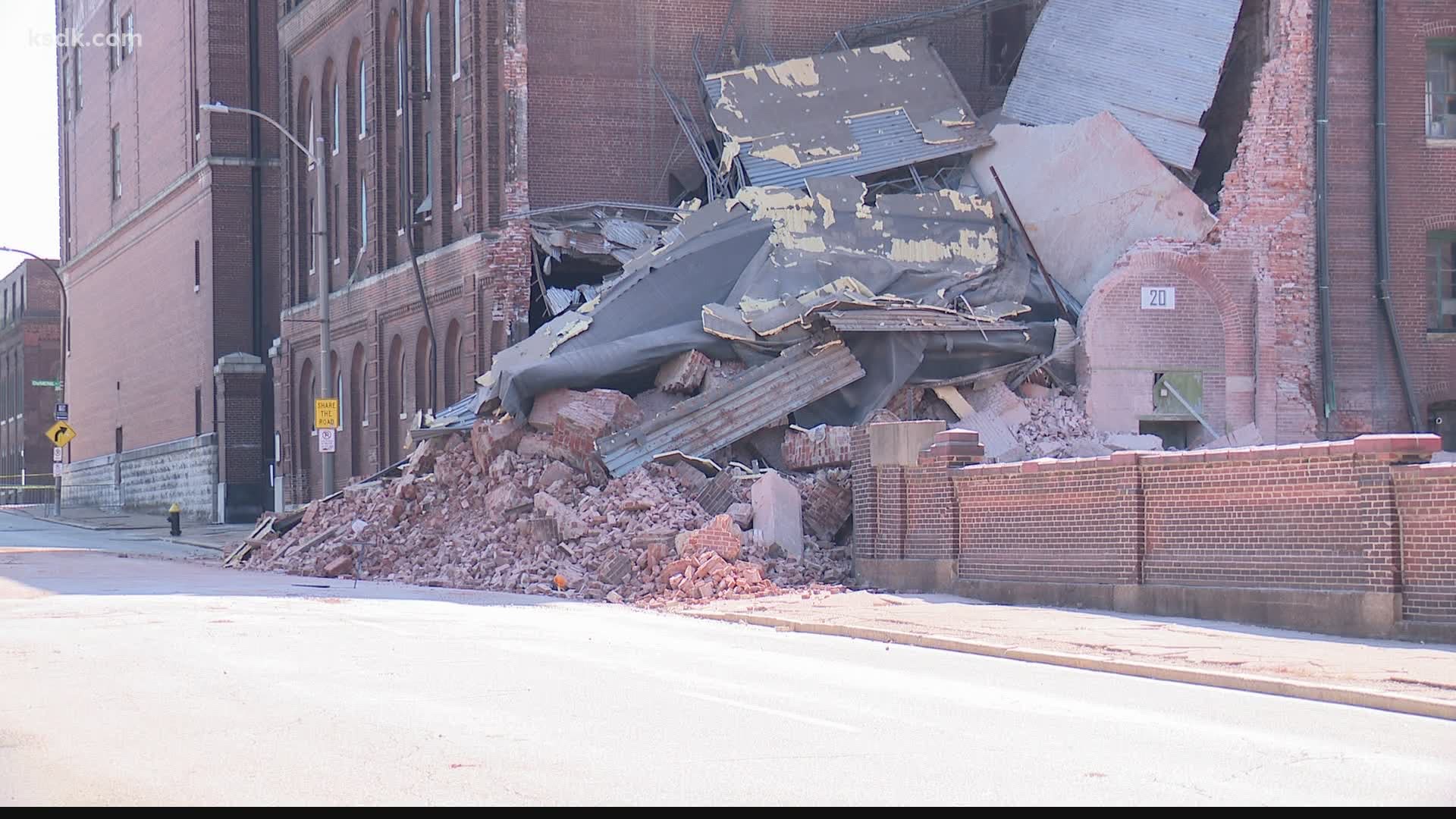ST. LOUIS — In a single morning, a booming hamburger restaurant lost its traffic, a nonprofit lost the bicycles it gives to kids and the city lost a century-old landmark.
The traffic will return and the bicycles might be recovered. The Lemp Brewery Complex Building 20 won’t get its history back.
Ward 9 alderman Dan Guenther was on the site Wednesday watching as crews started to make sense of what fell and what still needed to come down to be safe.
“The fact is, building No. 20 in 2020, pretty appropriate,” said Guenther.
About one-third of the building collapsed Sunday morning, sending a pile of bricks across Cherokee Street. Nobody was injured during the incident.
When it fell, Building 20 housed more than 700 bicycles for the St. Louis nonprofit organization BWorks. Those were bikes destined to be given to children who participated in BWorks programs.
The building has also been under a condemnation order from the city building division since 2003. As a condemned building, it had no occupancy permit to serve as storage. Details coming to light about Building 20 after its fall are leading community members to ask whether the highly visible historic building could have been saved.
“I drive by every day. I’d been noticing more and more bricks had been crumbling on it,” Guenther said.
He was joined by Chris “Mac” McKenzie, the owner of Mac’s Local Eats, which sits across Cherokee Street.
“There was so much dust from the collapse initially we thought maybe it was on fire,” McKenzie added.
Shashi Palamand owns the brewery complex through Historic Lemp Brewery LLC. He noticed the same signs as Guenther, and he said he was in the process of finding a fix.
“We found an engineering solution to strengthen the building,” said Shashi Palamand. “So we signed up with them. And unfortunately, due to the pandemic, they didn't have the manpower.”
While Palamand waited for workers to become available, he said, they put caution tape around portions of the building. After the collapse, the tape was still visible along the building’s west side.
In a statement, the executive director of BWorks wrote they had no idea the building was considered condemned by the city building division. The statement says the building’s owners told the nonprofit in 2017 that they did not need an occupancy permit for storage space. If they’d known, they added, they never would have stored their bikes inside.
Palamand told the I-Team that he was also surprised to find out that the city labeled the building condemned, which happened most recently in 2013.
“No, I was not aware,” said Palamand. “There was nothing posted. We were simply not aware of that, and we wouldn't have rented the building.”
Palamand says between 2006 and 2007, his company spent millions fixing the roof and adding stability to the structure. All that work, according to Palamand, had permits with the city and was inspected by the building division when it was completed.
“It's a bit of a labor of love,” he said.
Building commissioner Frank Oswald could not confirm that any building permits at the complex from those years was for work performed on Building 20. But he said that no one should have been using the building for storage.
“There was no occupancy permit issued. There is a requirement that for any kind of commercial storage like that, you're required to get an occupancy permit,” said Oswald.
He added in a later interview that the requirement for occupancy permits for storage has been consistent since before BWorks started leasing the space. City data shows occupancy permits for the complex as recent as 2015 were issued for storage purposes.
But Palamand told the I-Team’s PJ Randhawa that the rules as he knew them at the time were different. “They didn't require a business license and occupancy permit at that time,” he said. “We will adjust accordingly.”
Mac’s Local Eats has already cleared space to serve its customers. BWorks is waiting for updates on the bikes buried in the debris. On that point, Palamand had positive news. “The vast majority of them appear to be OK,” he said.
The I-Team wanted to know who was ultimately responsible for the collapse. According to Oswald, that falls on the owners.
“I think it's probably the owners’ fault if they're renting property to somebody and it's not in a safe condition. It’s generally the owner’s responsibility, but that’s for the courts to decide,” he said.
Palamand sees it differently. “We did all we could. Know we tried to preserve this building. As soon as we saw that there was an issue, we brought in experts to give us some guidance,” he said.
The city is inspecting the other buildings in the complex to make they’re safe. Palamand told the I-Team that he’s also making sure all his tenants have the appropriate permits. Clean up will take weeks and carry a heavy price tag, but Palamand says it’s worth it.
“The history of United States, especially its industrial history, fascinates me. It's very important to me to preserve, especially industrial buildings,” he said.


